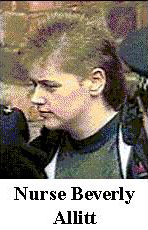|
The medic who murders is always held in
especial fear as we're alone with them whilst lying down in a weak and
semi-naked state. They've been trained for years to make us better -
but a few of them have macabre plans for our flesh.
Murderous medics can kill numerous times.
One male nurse, Brian Rosenfield of Florida, killed at least twenty
five elderly patients. Another male nurse, Roberto Diaz of California
was found guilty of murdering twelve. And hospital orderly Donald
Harvey admitted to over fifty such homicides. More recently, a British
male nurse was found guilty of administering a date rape drug to
several female patients. One of his victims, a trusting friend, had an
allergic reaction to the drug and died.
Women also regularly murder in a medical
setting. Beverley Allitt, a nurse who exhibited Munchausen's Syndrome
By Proxy, is probably Britain's most famous female hospital killer.
She injected helpless babies with near-lethal doses of insulin then
attempted to revive them in front of other nurses and the infants
families. This won her what she most craved - her colleagues attention
and the parent's gratitude and praise. She pretended to adore those
children but was really indifferent to their pain.

Nurse Allitt knew that when she injected
insulin into these babies that they would have hypoglycaemic seizures
and possibly fall into a coma. She also injected potassium into other
children bringing on convulsions and heart attacks. When she could no
longer gain access to such medication she semi-suffocated the infants
in her care.
Beverley herself had been shown care as a
child mainly when she hurt herself so damage and love became
intricately entwined for her. Like all Munchausen practitioners she
also had very low self esteem. Indeed, she became so severely anorexic
during her trial that she often couldn't attend court.
Found guilty of killing four children and
grievously harming many more, she was sentenced to life imprisonment.
She remains in a secure hospital for the mentally ill where she's
alleged to have fallen in love with another patient and has plans to
marry him.
Her background and motivation were
similar to that of American nurse Genene Jones, who features in this
author's book Women Who Kill: Profiles of Female Serial Killers.
Genene injected one baby with such a large dose of anti-coagulant that
the poor infant had blood oozing from every orifice.
The book also includes the case of two
American lesbian care workers who restrained and suffocated their
elderly patients. They'd sadistically threatened and
partially-asphyxiated some of these patients in the days before their
deaths and the patients were clearly terrified of the two care
assistants - but witnesses put the patients' terror down to senility.
Dr Harold Shipman - UK
Mass Murderer
The most recent case of a murdering medic
to make British headlines is that of Dr Harold Shipman who was
convicted of fifteen murders on the 31st January 2000 and sentenced to
life imprisonment. Shipman was a  general
practitioner who regularly visited his older patients in their modest
homes. As women regularly outlive men, most of his elderly patients
were females who lived alone. general
practitioner who regularly visited his older patients in their modest
homes. As women regularly outlive men, most of his elderly patients
were females who lived alone.
He would tell each woman that he was
going to give her a vitamin injection or take a blood sample. Instead,
he'd inject her with a fatal dose of morphine and within seconds she'd
lapse into unconsciousness. Moments later her breathing would stop and
he'd leave the home.
Most serial killers are tried for far
fewer murders than they actually carry out and Shipman is probably no
exception. Relative after relative came forward to say that their
parents appeared in good health then died within minutes of the
well-liked doctor appearing on the scene. The police investigated over
a hundred potentially suspicious deaths under his care but some of the
corpses were so decomposed that it was impossible to tell if they'd
once contained his deadly medicine. But many families remain convinced
that the doctor lethally injected their relatives - and one coroner
suggested Shipman may have murdered up to a thousand elderly patients
during his thirty years as a general practitioner.
The little we know about Shipman's
childhood suggests it was far less abusive than that of virtually
every other serial killer. Granted, his childhood was a solitary one
as his parents didn't like him mixing with the other working class
kids, wanting him to rise above them. But it doesn't appear to have
been so physically and emotionally cruel that it would cause him to
kill.
There was early tragedy in his life
though, for his mother contracted cancer when Harold was still a shy
study-obsessed teenager. Every day he'd come home from school and sit
by the painridden woman - and every so often the doctor came by and
gave her an injection of morphine that brought her instant relief.
Less is known about his lorry driver father but when the man died,
Shipman said he wasn't sorry that he was dead.

Stress may have affected Harold Shipman's
state of mind and had some bearing on the murders. The young medic got
his girlfriend pregnant when they were both seventeen, so he was a
married man with a baby to support at a very early age. He also took
on a huge workload and had so little money that at times they had to
live with his wife's parents in a disapproving and deeply religious
environment.
When a person is under such long term
pressure it leads to a certain callousness as the person has nothing
left to give. Shipman may have killed some of his more demanding
patients for this reason, seeing them as time-wasters in his
queued-out surgery.
But this can't be the full explanation as
he killed one woman who had handed in a Christmas present to his
surgery the day before. She made no demands on his time and clearly
regarded him very positively. He killed other elderly women who were
in very good health and who did lots of charitable work in the
community so these weren't euthanasia-style deaths.
And they weren't sexual. One woman walked
in on Shipman unexpectedly moments after he'd killed her friend. The
dead woman's blouse was still buttoned to the neck and Shipman was
over in the corner admiring her ornaments. He didn't stay with the
bodies after injecting them, something a sadistic necrophile would
definitely do.
The power motive also doesn't hold here.
The victims drifted into sleep within seconds so showed no signs of
anxiety. Indeed, many relatives commented on how peaceful they looked.
These were almost instant, if unnatural, deaths.
Harold Shipman remains a diagnostic
mystery - and he's still not talking. His wife has vowed to stand by
him and some of his more loyal patients have said that they'd still
trust him with their lives.
Women Who Kill: Profiles of Female Serial
Killers by Carol Anne Davis was published in April by Allison &
Busby priced £6.99 
|